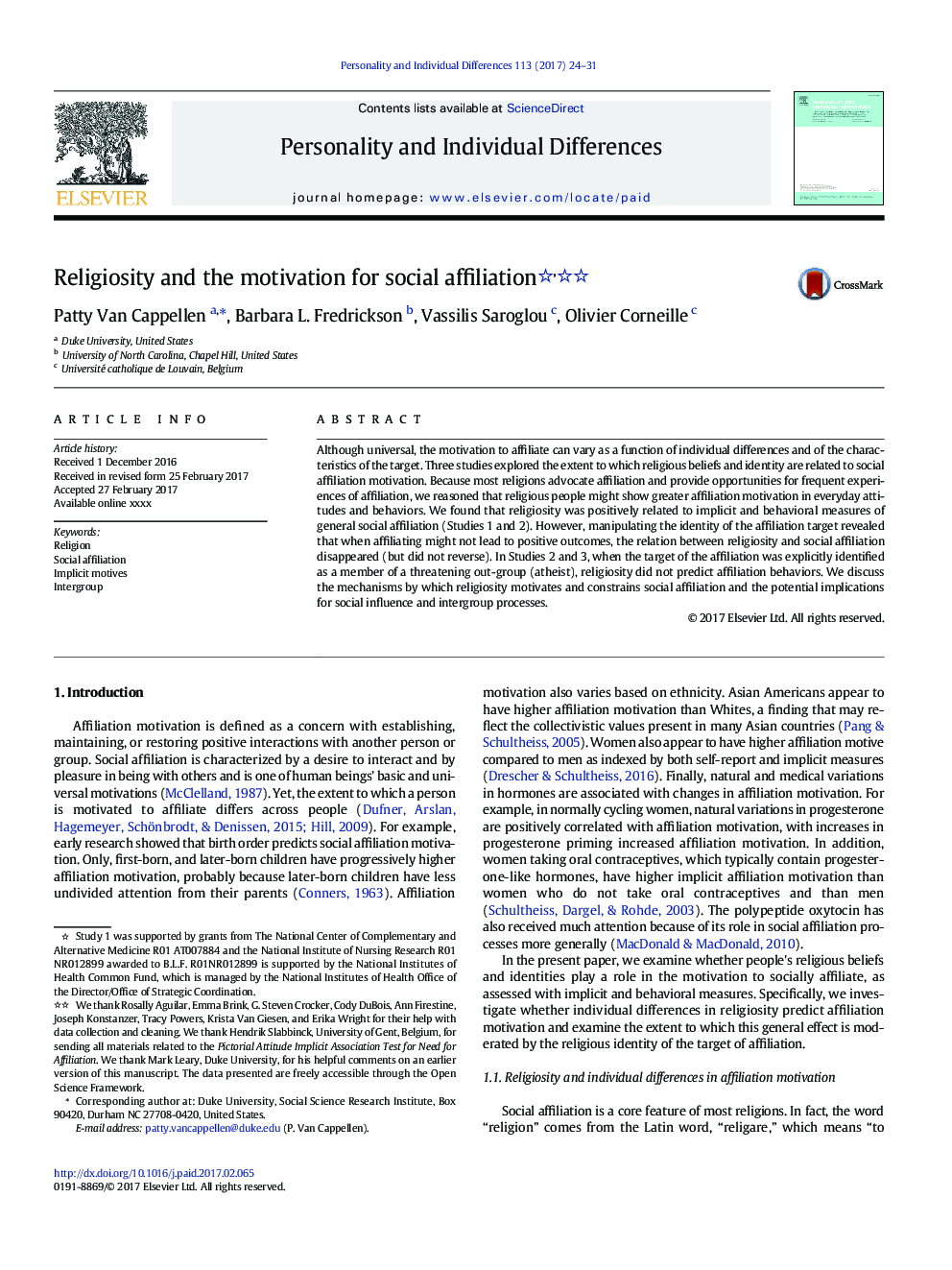| کد مقاله | کد نشریه | سال انتشار | مقاله انگلیسی | نسخه تمام متن |
|---|---|---|---|---|
| 5035754 | 1472005 | 2017 | 8 صفحه PDF | دانلود رایگان |
عنوان انگلیسی مقاله ISI
Religiosity and the motivation for social affiliation
ترجمه فارسی عنوان
دین و انگیزه وابستگی اجتماعی
دانلود مقاله + سفارش ترجمه
دانلود مقاله ISI انگلیسی
رایگان برای ایرانیان
کلمات کلیدی
ترجمه چکیده
اگر چه جهانی است، انگیزه وابستگی می تواند به عنوان عملکرد تفاوت های فردی و ویژگی های هدف متفاوت باشد. سه مطالعه به بررسی میزان اعتقادات مذهبی و هویت به انگیزه وابستگی به اجتماع پرداخته است. از آنجایی که اکثر ادیان از وابستگی حمایت می کنند و فرصت هایی برای تجربه های مکرر وابستگی فراهم می آورند، ما استدلال کردیم که افراد مذهبی ممکن است انگیزه وابستگی بیشتری را در نگرش ها و رفتارهای روزمره نشان دهند. ما دریافتیم که اعتقادات مذهبی به طور مثبت با معیارهای رفتاری و معیارهای وابستگی اجتماعی عمومی (مطالعات 1 و 2) مرتبط است. با این حال، دستکاری هویت هدف وابستگی نشان داد که زمانی که وابستگی ممکن است منجر به نتایج مثبت شود، رابطه بین دینداری و وابستگی اجتماعی ناپدید شد (اما معکوس نشد). در مطالعات 2 و 3، زمانی که اهداف وابستگی به صراحت به عنوان یک عضو گروه تهدید کننده شناسایی شد (مذهبی)، دینداری رفتارهای وابستگی را پیش بینی نمی کرد. ما در مورد مکانیسم هایی که دینداری را ایجاد می کند و وابستگی اجتماعی را محدود می سازد و پیامدهای بالقوه ای برای تأثیرات اجتماعی و فرایندهای گروه های بین المللی محسوب می شود، بحث می کنیم.
موضوعات مرتبط
علوم زیستی و بیوفناوری
علم عصب شناسی
علوم اعصاب رفتاری
چکیده انگلیسی
Although universal, the motivation to affiliate can vary as a function of individual differences and of the characteristics of the target. Three studies explored the extent to which religious beliefs and identity are related to social affiliation motivation. Because most religions advocate affiliation and provide opportunities for frequent experiences of affiliation, we reasoned that religious people might show greater affiliation motivation in everyday attitudes and behaviors. We found that religiosity was positively related to implicit and behavioral measures of general social affiliation (Studies 1 and 2). However, manipulating the identity of the affiliation target revealed that when affiliating might not lead to positive outcomes, the relation between religiosity and social affiliation disappeared (but did not reverse). In Studies 2 and 3, when the target of the affiliation was explicitly identified as a member of a threatening out-group (atheist), religiosity did not predict affiliation behaviors. We discuss the mechanisms by which religiosity motivates and constrains social affiliation and the potential implications for social influence and intergroup processes.
ناشر
Database: Elsevier - ScienceDirect (ساینس دایرکت)
Journal: Personality and Individual Differences - Volume 113, 15 July 2017, Pages 24-31
Journal: Personality and Individual Differences - Volume 113, 15 July 2017, Pages 24-31
نویسندگان
Patty Van Cappellen, Barbara L. Fredrickson, Vassilis Saroglou, Olivier Corneille,
